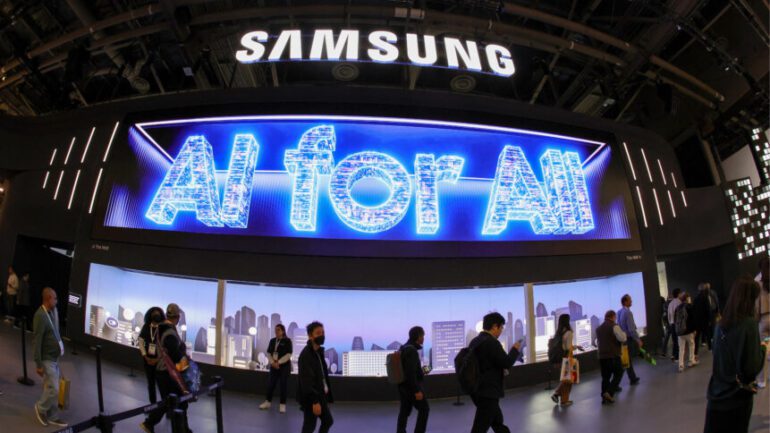TL;DR:
- Samsung Electronics clinches a contract to produce 2nm AI chips, challenging TSMC’s leadership.
- PFN, a Japanese AI startup, opts for Samsung over TSMC, signaling a potential shift in the semiconductor landscape.
- Samsung’s comprehensive chip manufacturing capabilities and competitive pricing entice PFN away from TSMC.
- The competition between Samsung and TSMC intensifies as both strive for technological superiority in chipmaking.
- Samsung plans to begin mass production of its 2nm process in 2025, aiming to capture a larger market share.
Main AI News:
As the quest for technological supremacy and market dominance continues, Taiwan Semiconductor Manufacturing Company (TSMC) and Samsung Electronics are at the forefront of semiconductor manufacturing. With the surge in demand for advanced chips in the 5G, AI, and IoT era, competition is fierce, fostering innovation. Both companies are racing to achieve smaller nanometer nodes, which is crucial for technological progress.
In the realm of semiconductor innovation, TSMC leads with ambitious plans for 3nm and 2nm chips, promising enhanced performance and efficiency. However, Samsung, renowned for its memory chip expertise, is mounting a strong challenge to TSMC’s dominance. Recent reports indicate that Samsung is on the verge of unveiling its 2nm chip technology, a significant milestone in its rivalry with TSMC.
In a surprising development revealed during Samsung’s Q4 2023 financial report, the tech community was abuzz with news of Samsung’s foundry division securing a pivotal contract for 2nm AI chips. While Samsung kept the partner’s identity under wraps, a recent revelation from Business Korea disclosed that the partner is Japanese AI startup Preferred Networks Inc. (PFN). PFN, a powerhouse in AI deep learning, has garnered significant investments from industry giants like Toyota, NTT, and FANUC, a leading Japanese robotics firm.
Samsung vs. TSMC Samsung, headquartered in Suwon, South Korea, is poised to deploy its cutting-edge 2nm chip processing technology to manufacture AI accelerators and other advanced AI chips for PFN, as confirmed by industry insiders on February 16, 2024. If this landmark deal is genuine, it could benefit both parties. PFN would gain access to state-of-the-art chip innovations for a competitive edge, while propelling Samsung in its rivalry with TSMC in the foundry market, insiders report.
Ironically, PFN has had a longstanding partnership with TSMC since 2016 but has opted to switch gears, choosing Samsung’s 2nm node for its upcoming AI chip lineup. PFN’s decision stems from Samsung’s comprehensive chip manufacturing capabilities, encompassing chip design, production, and advanced packaging.
Experts speculate that while TSMC has a broader clientele for 2nm chips, PFN’s move to Samsung hints at a potential shift in favor of the Korean giant. This pivotal decision may lead other significant clients to align with Samsung, reshaping the competitive landscape in chipmaking.
In the competitive world of contract chipmaking, TSMC holds sway, securing major deals with industry giants like Apple Inc. and Qualcomm Inc. However, as the demand for top-tier chips rises, the battle for technological superiority intensifies, with TSMC and Samsung leading the charge. While TSMC currently leads with 2nm chips for clients like Apple and Nvidia, Samsung is closely behind.
“Apple is poised to be TSMC’s first customer for the 2nm process, positioning TSMC at the forefront of advanced process technology competition,” TrendForce stated. Meanwhile, Samsung’s roadmap indicates that its 2nm SF2 process will debut in 2025.
“As outlined in Samsung’s Foundry Forum (SFF) plan, Samsung will commence mass production of the 2nm process (SF2) in 2025 for mobile applications, expanding to high-performance computing (HPC) applications in 2026 and further extending to the automotive sector and the anticipated 1.4nm process by 2027,” TrendForce noted.
Compared to the second-generation 3GAP process at 3nm, the 2nm process offers a 25% improvement in power efficiency at the same frequency and complexity and a 12% performance boost at the same power consumption and complexity while reducing chip area by 5%. With TSMC aiming for mass production of 2nm chips by 2025, the competition between these tech giants is poised to escalate.
However, in a strategic move reported by the Financial Times, Samsung is preparing to attract customers with discounted rates for its 2nm process, shaking up the semiconductor landscape. Targeting Qualcomm’s flagship chip production, Samsung aims to lure clients away from TSMC by offering competitive pricing. This bold initiative underscores Samsung’s determination to gain a larger market share and challenge TSMC’s dominance in the semiconductor industry.
Conclusion:
Samsung’s success in securing the 2nm AI chip contract marks a significant challenge to TSMC’s dominance in the semiconductor market. With the potential for more clients to align with Samsung and its comprehensive manufacturing capabilities, the competitive landscape is poised for transformation. TSMC will need to adapt to this new competition and innovate to maintain its position as a market leader.

